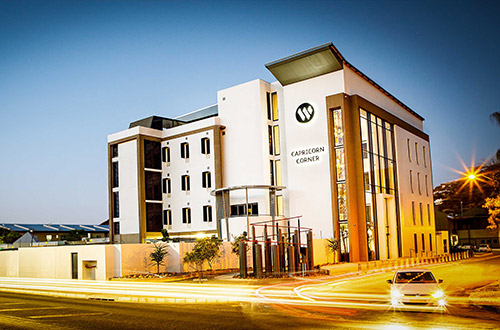The Capricorn Group continues to shake off the depressing shackles of Covid-19, high inflation and slow economic activity by posting solid results, highlighted by an almost
30% increase in profit after tax to N$1.47 billion. This rebound was made on the back of improved net interest margins, reduced credit impairment losses, strong growth in non-interest income, and efficient operations.
Releasing the home-grown group’s results on Friday for the year ending 30 June, group CEO Thinus Prinsloo emphasised a continued focus on working towards a sustainable future for all stakeholders. The four main pillars of the group’s business, on which its performance is evaluated, are earnings quality, credit quality, liquidity and capital depth.
“As responsible corporate leaders, we must challenge our relevance to stakeholders, and continuously re-evaluate how we make an impact. I am pleased that our commitment to improving lives through leadership in financial services by being Connectors of Positive Change has impacted many lives positively this past financial year, resulting in value-creation of note for all our stakeholders,” said Prinsloo.
The latest results for Capricorn, which plays significant financial services’ roles in Namibia and Botswana, indicate that the Group increased its value created by N$728 million to N$4.4 billion, compared to the previous financial year. Of the total value created, 26.4% is represented by staff remuneration and benefits, 18.3% was paid to suppliers, and 22.6%, which amounts to N$1 billion, was contributed to
the government in the form of direct and indirect taxes. The Group retained about N$1 billion for future growth endeavours.
The Group’s chief financial officer Johan Maass said the increased injection into the economies of the countries in which the Group operates can largely be attributed to the satisfactory growth of banking subsidiaries as the banking sector continued its recovery post-Covid-19, an improvement in net-interest income largely due to the endowment effect of higher interest rates, a growing loan book, and prudent cost of funding management.
“We have also experienced lower credit impairment charges, on the back of an improving operating environment and prudent and proactive credit risk management. We expect further economic recovery and improved operating conditions in our region in the medium to long-term. Namibia and Botswana have exciting prospects, some linked to natural resources and others to developing industries, including agriculture, logistics, manufacturing and tourism,” he added.
Net-interest margins
Capricorn’s net interest income before impairments increased by 16.3% to N$2.72 billion (2022: N$2.38 billion), mainly attributable to the net-interest income of Bank Windhoek increasing by 17.8% following a series of interest rate increases totalling 300 basis points over the financial year. As a result of cost of funding management, Bank Windhoek’s cost of funding only increased by 208 basis points over the financial year.
Bank Gaborone’s net interest income increased by 12.0% off the back of loan book growth of 10.4%, while their net interest margin improved from 2.91% to 3.81%, following an effective asset repricing strategy and effective cost of funding management in a volatile market.
Non-interest income
Non-interest income was significantly bolstered by diversified income streams, including asset management fees income of N$187.3 million (2022: N$164.6 million) and net insurance premium income of N$179.1 million (2022: N$161.3 million).
Non-interest income increased by 13.1% to N$1.89 billion (2021: N$1.67 billion), mainly driven by transaction-based fee income increasing by N$197.8 million (18.2%), mainly as a result of higher transactional volumes, particularly through electronic channels.
Capital Position
The group improved on its capital position, with a total risk-based capital adequacy ratio of 16.9% (2022: 15.8%), above the minimum regulatory requirement of 10%. Owing to these results, Capricorn declared a final dividend of 61 cents per ordinary share, which is scheduled to be paid to shareholders on 20 October 2023. Including the interim dividend of 39 cents per ordinary share, this represents a total dividend of 100 cents per ordinary share (2022: 72 cents). This is a 38.9% increase in the total dividend per share for 2022. The Group continues to balance offering attractive returns for shareholders with retaining capital to drive growth and diversification.



